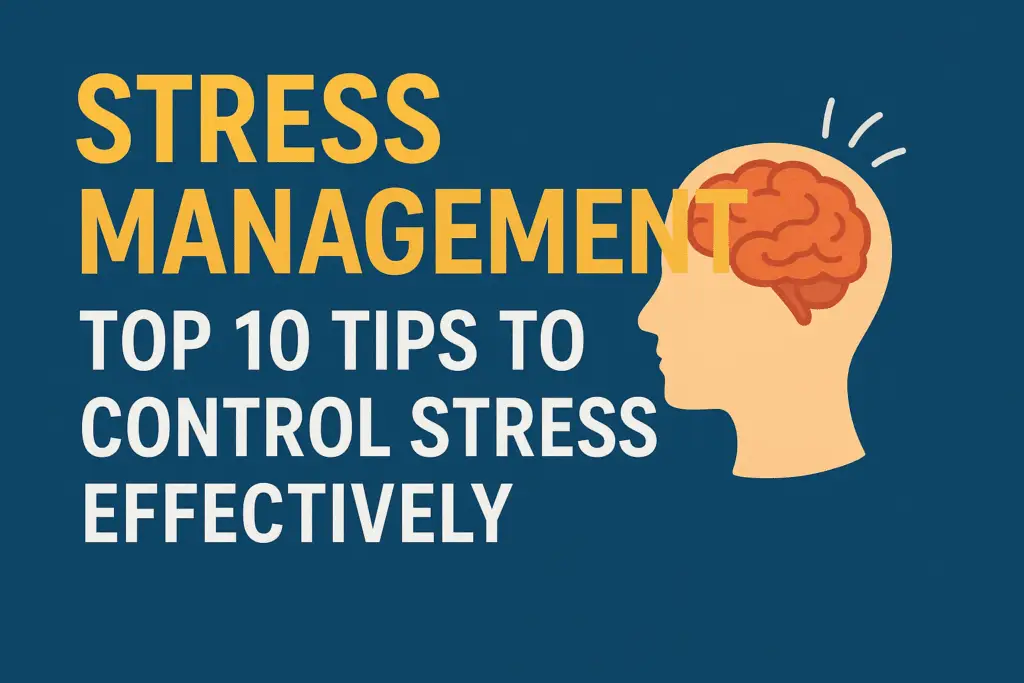In today’s fast-paced world, stress has become a common part of daily life. From deadlines at work to personal responsibilities, we all experience pressure in one form or another. While some stress can be motivating, excessive or prolonged stress can have serious consequences for both physical and mental health. This is where stress management becomes essential.
Stress management is not about eliminating stress completely—since that’s nearly impossible—but about learning how to handle stress in healthier and more productive ways. With the right strategies, you can reduce stress, improve focus, and live a more balanced lifestyle.
In this article, we will explore the top 10 tips for stress management that can help you take control of your life and maintain inner peace.
What is stress management?
Stress management refers to a set of techniques and practices designed to reduce stress levels, improve resilience, and promote overall well-being. It includes lifestyle changes, coping strategies, and relaxation techniques that allow individuals to handle stressful situations effectively.
Without stress management, prolonged stress can lead to health problems such as:
- Anxiety and depression
- Insomnia
- High blood pressure
- Weakened immune system
- Digestive problems
- Heart disease
Therefore, mastering stress management is not just about feeling calmer—it’s about protecting your health and improving your quality of life.
Stress Management: Top 10 Tips to Control Stress Effectively
Let’s dive into the 10 most effective tips for managing stress in your daily life.
1. Practice Mindfulness and Meditation
One of the most powerful stress management techniques is mindfulness meditation. By focusing on the present moment and letting go of unnecessary worries, you can calm your mind and body.
How to do it:
- Find a quiet place and sit comfortably.
- Close your eyes and focus on your breathing.
- When your mind wanders, gently bring it back to your breath.
Even 10 minutes of meditation a day can significantly reduce stress levels, improve concentration, and enhance emotional balance.
2. Exercise Regularly
Physical activity is a natural stress reliever. Exercise releases endorphins—also known as “feel-good hormones”—that improve mood and lower stress. It also reduces cortisol, the body’s stress hormone.
Best exercises for stress management include:
- Walking or jogging
- Yoga and stretching
- Dancing
- Swimming
- Cycling
Aim for 30 minutes of exercise most days of the week for maximum benefits.
3. Maintain a Healthy Diet
What you eat plays a big role in stress management. A well-balanced diet provides the body with the nutrients it needs to cope with stress.
Foods that help reduce stress:
- Leafy greens (spinach, kale)—rich in magnesium
- Nuts and seeds—packed with healthy fats
- Fatty fish (salmon, tuna)—high in omega-3s
- Herbal teas—chamomile, green tea, lavender
- Fruits (oranges, berries)—high in vitamin C
Avoid excessive caffeine, sugar, and processed foods, as these can increase stress levels and cause energy crashes.
4. Get Enough Sleep
Lack of sleep is one of the biggest contributors to stress. When you are sleep-deprived, your body produces more cortisol, making you feel anxious and unfocused.
Tips for better sleep:
- Stick to a consistent sleep schedule.
- Create a relaxing bedtime routine (reading, warm shower, light stretching).
- Avoid using phones or laptops before bed.
- Keep your bedroom cool, dark, and quiet.
Aim for 7–9 hours of quality sleep per night for optimal stress management.
5. Manage Your Time Wisely
Poor time management can lead to overwhelming stress. Learning how to prioritize tasks and set boundaries is a key part of stress management.
Effective time management techniques:
- Use to-do lists or digital planners.
- Prioritize important tasks first.
- Break large projects into smaller steps.
- Learn to say “no” when necessary.
By organizing your day effectively, you reduce stress and increase productivity.
6. Practice Deep Breathing Exercises
Breathing exercises are a quick and effective way to reduce stress instantly. Deep breathing activates the body’s relaxation response, slowing your heart rate and lowering blood pressure.
How to practice deep breathing:
- Sit comfortably and place one hand on your stomach.
- Inhale deeply through your nose for 4 seconds.
- Hold your breath for 4 seconds.
- Exhale slowly through your mouth for 6–8 seconds.
- Repeat for 5–10 minutes.
This simple practice can be done anytime you feel overwhelmed.
7. Stay Connected with Loved Ones
Strong relationships are vital for stress management. Talking to friends or family members can provide emotional support and help you see problems from a different perspective.
Ways to strengthen social connections:
- Spend time with loved ones regularly.
- Join a club or group with similar interests.
- Volunteer to help others.
- Share your thoughts and feelings openly.
Social support acts as a buffer against stress and promotes emotional well-being.
8. Limit Screen Time and Social Media
While technology connects us, too much screen time—especially on social media—can increase stress levels. Constant exposure to negative news, online comparisons, and digital overload can drain your mental energy.
Tips to manage screen time:
- Set daily limits for social media use.
- Take regular digital detox breaks.
- Avoid screens at least 1 hour before bed.
- Use apps that track and limit screen usage.
By reducing digital distractions, you allow your mind to rest and recharge.
9. Practice Gratitude
Gratitude is a simple yet powerful tool for stress management. Focusing on what you are thankful for shifts your mindset away from stress and negativity.
Ways to practice gratitude:
- Keep a gratitude journal and write 3 things you’re grateful for daily.
- Express appreciation to others through words or notes.
- Reflect on positive experiences before going to bed.
This practice helps train your brain to focus on positivity, reducing overall stress levels.
10. Seek Professional Help When Needed
Sometimes, stress becomes overwhelming and difficult to handle on your own. In such cases, seeking professional help is an important step in stress management.
Options for professional support include:
- Therapy or counseling
- Stress management workshops
- Support groups
- Talking to a doctor about possible treatments
Remember, asking for help is not a sign of weakness but a step toward healing and balance.
Additional Stress Management Tips
Apart from the top 10 strategies, here are some bonus tips to strengthen your stress management routine:
- Listen to music: Calming music can instantly reduce stress.
- Engage in hobbies: Creative activities like painting, gardening, or cooking can be therapeutic.
- Laugh more: Watch a comedy show, read jokes, or spend time with fun people.
- Practice positive self-talk: Replace negative thoughts with encouraging affirmations.
Benefits of Effective Stress Management
When you apply these techniques, you’ll notice improvements in different areas of life, including:
- Better physical health
- Improved focus and decision-making
- Stronger relationships
- Higher productivity
- Greater emotional balance
- Enhanced quality of life
Stress management doesn’t just help you cope—it helps you thrive.
Conclusion
Stress is an inevitable part of life, but it doesn’t have to control you. With the right stress management techniques, you can reduce stress, build resilience, and live a more peaceful and fulfilling life.
By practicing mindfulness, exercising regularly, eating healthy, managing time wisely, and seeking support when needed, you take proactive steps toward controlling stress effectively.
Start small by implementing one or two tips from this guide, and gradually build your stress management toolkit. The more consistent you are, the more powerful the results will be.
Remember: managing stress is not about perfection—it’s about progress. Take care of your mind and body, and you’ll discover the strength to handle life’s challenges with calm and confidence.



